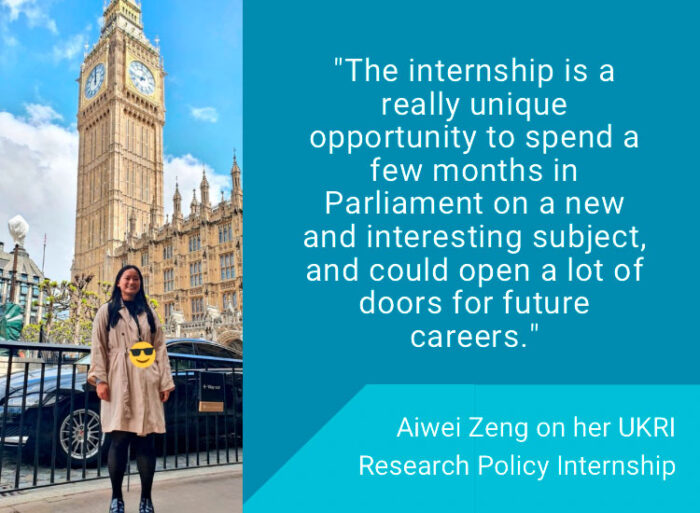
Aiwei Zeng, a PhD student in John O’Neill’s group in the LMB’s Cell Biology Division, has recently completed a UKRI Policy Internship at the Parliamentary Office of Science and Technology (POST). The scheme provides placements for UKRI-funded doctoral students to spend three months working at an influential policy organisation. This gives students direct experience in converting research outputs to policy.
Here, Aiwei discusses her experience, including how work at POST differed to her usual research at the LMB, the new skills she learnt, and why she would recommend other PhD students to apply.
Why did you apply for a UKRI Policy Internship?
I wanted to see what it was like to work in a scientific environment outside of academia. The internship at POST sounded like a really interesting experience and I wanted to see if a career in science policy would be one I want to pursue after my PhD and if I have any of the skills required to succeed at it.
What did your internship involve?
My project was to work on a POSTnote about inclusion in elite sports. POSTnotes are four-page long research briefings which aim to inform MPs and Peers about a broad research area. POSTnotes are researched and written in around two months and then, after an extensive internal and external peer review process, they are publicised and disseminated online through POST’s website and Twitter page and are also made available to parliamentarians online and as hard copy in the House of Lords and House of Commons libraries.
During my internship, I carried out literature research, ranging from scientific papers to government white papers, and policy reports from campaign groups and sports organisations. A large bulk of my knowledge came from interviewing stakeholders from a range of disciplines, such as sports scientists, international sports organisations, charities and lawyers. I wrote the POSTnote, which was so complex that it ended up becoming two separate POSTnotes, which is very unusual at POST. Throughout the internship, I received a lot of close mentoring from Dr Sarah Bunn, one of POST’s eight scientific advisers, who helped edit my work and supported me throughout the internship.
How did your work at POST differ to your usual work at the LMB?
The work at POST was extremely different from my usual work. Firstly, it was in a totally different field to my research area, so while I had some residual knowledge of physiology from undergraduate studies, I had to quickly learn a lot about sports science, ethics and law. Normally I spend most of my time either carrying out experiments or analysing data, and a much smaller percentage of my time reading papers and writing. At POST, the bulk of my work was scouring literature and writing drafts. The pace of work at POST was surprisingly fast as I had to complete my research (including interviewing people) and writing in two months. By contrast, the nature of my usual research on circadian rhythms is slow: each experiment usually takes at least two weeks from start to end so it can take a while to see results.
Did any prior knowledge or skills from your PhD studies come in handy? Did you learn any new skills at POST that might be useful back at the LMB?
I think the biggest skill I took from my PhD to the internship was the ability to quickly digest a lot of literature while retaining a critical eye to evaluating the quality of the research. However, I definitely learnt a lot about writing, especially for communicating scientific research to a non-scientific audience. Scientific writing, especially in academia, can be unnecessarily over-complicated, so I think it’s a great skill to be able to communicate concisely and informatively. These skills will be incredibly useful for my upcoming PhD thesis writing!
What did you get up to when you weren’t working?
My cohort of Policy Fellows was very sociable and we would often have lunch together in the various canteens in Parliament (while trying to spot famous people – I bumped into Keir Starmer twice) and attended events such as Prime Minister’s Questions, Parliamentary debates or select committee hearings. It’s also really fun to work in Westminster as there is always a lot going on to look at!
Did you learn anything that surprised you?
I learnt so much about the way that Parliament works, for example, I didn’t realise before the extent to which Parliament and Government are separate institutions. Also, there are loads of tunnels all over Westminster which connect different buildings to each other underground, including a tunnel going straight from the tube into the Palace of Westminster which is really cool.
Has completing this internship shaped your career plans in any way?
It has definitely made me consider a career in science policy after my PhD, as the work is super varied and offers the chance of making a direct impact on the general public. The internship was a really good opportunity to understand the many different possible career paths in science policy and communications for someone with a PhD.
What advice would you give to other PhD students considering applying to this internship?
The internship is a really unique opportunity to spend a few months in Parliament on a new and interesting subject, and could open a lot of doors for future careers. Overall, it was really enjoyable so I would say definitely go for it!
Applications for 2023 UKRI Policy Internships are now open and close on 4th November 2022.
Further references
UKRI Policy Internships scheme
From PhD to policy evaluation: Florence Young completes a Research Policy Internship